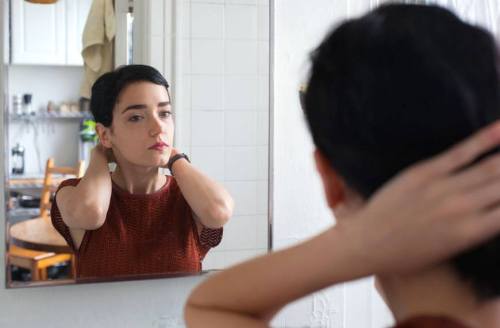So I’m out for a run one day in my Brooklyn neighborhood: The sun’s out, I’m absorbed in a podcast as usual (heyyyy, “Late Night Whenever with Michelle Buteau“), and I feel like a champ for upping my mileage. The moment feels not quite worthy of the Rocky theme—but maybe warrants classic Destiny’s Child? Yeah, bring on the camouflage outfits.
As I turned the corner and jogged the last block to my apartment, though, my bladder also took a turn. For the worst. As in, nightmare scenario. While I waited for the light to change so I could cross the street and run upstairs, I felt pee running down my legs and pooling in my socks. My running shorts were already soaked with sweat, so at least my predicament wasn’t immediately noticeable to casual passersby—but it all happened so quickly, and it was so surreal, that I momentarily froze, in panic.
Once I got my wits about me (and got cleaned up, ugh), I immediately started Googling—and made an appointment with my doctor. She told me it was a case of “shy bladder” and it’s “just one of those things that happens.” But since I’ve never given birth and had no other health issues, it seemed crazy to me that this just happens. This was years ago, but I’ve always wanted more answers—so I reached out to an expert to get them.
“You don’t feel any strong urge [to urinate], but when you put the key in the door or get to the bathroom—then there’s a strong urge or even worse, you can even start urinating.” —Bilal Chughtai, MD
According to Bilal Chughtai, MD, urogynecological expert at Weill Cornell Medicine and New York-Presbyterian, what I had wasn’t “shy bladder,” which is when you have trouble peeing when you’re not at home (AKA bathroom stage fright). What happened to me on the street that day was “keyhole” incontinence. And, as my doctor had told me, it’s pretty common.
“This is when you don’t feel any strong urge [to urinate at first], but when you put the key in the door or get to the bathroom—then there’s a strong urge or even worse, you can even start urinating. Anxiety can worsen these conditions, but is not a cause of this,” Dr. Chughtai says.
After my running debacle, I began to get that familiar (urinary) feeling every day when I got home from work, just as Dr. Chughtai describes it—and I sprinted up four flights of stairs to get to the bathroom just in time. Since I had no urinary tract infections or other physical health issues, I started using a meditation app once a day and did everything I could to lower my stress levels (AKA setting boundaries at work, where I had been on call 24 hours a day). It happened less and less frequently, and finally, not at all.
So, yes, it is treatable—and it’s definitely worth a trip to your doctor, who can prescribe anything from pelvic floor exercises to (in extreme cases) surgery. I wish I had sought out experts sooner, because honestly, I just assumed something was massively wrong with me. (Women: Why do we do that?) I shared my “shame” during a Team Well+Good brainstorm—and it turns out a lot of my colleagues had their own questions.
So while I had Dr. Chughtai’s ear, I peppered him with our editors’ top Qs about pee.

Is “breaking the seal” a real thing?
Ask any group of college kids at a kegger, and they’ll tell you this is a thing—that first trip to the bathroom is a long time coming, but after that you’ll be back in no time. Is this really true, though? “Yes, this can occur. Basically, if you are ‘holding’ your urine for long periods of time, the muscles fail to relax and empty. Thus you may end up with a period of time as the muscles redjust and this leads to multiple small voids until the muscles relax and come back to baseline,” Dr. Chughtai says.
What does it mean if you have a strong stream? Or, conversely, if you feel like you really have to pee but it comes out slowly?
“The strength of the stream is really dependent on how full the bladder the is—the more full, the stronger the stream,” he says. “Consistently weak streams can come from scar tissue, infections, or other conditions. If your stream is always weak, it’s a good reason to seek medical attention.”
And finally, what happens when you hold it for too long? Is it dangerous?
“You will eventually just urinate. Holding it for long periods of time can likely lead to shortening or the failure of relaxation of the muscles of bladder if this is done regularly,” Dr. Chughtai says. So if you don’t want to know what it feels like to just let it all hang out (stream out?) on the street like I did, get up from that laptop at regular intervals.
To improve bladder control (and your sex life), celeb yogi Hilaria Baldwin recommends these lower-ab exercises. And on another TMI topic, here’s why you should never hold in farts.
Sign Up for Our Daily Newsletter
Get all the latest in wellness, trends, food, fitness, beauty, and more delivered right to your inbox.
Got it, you've been added to our email list.








